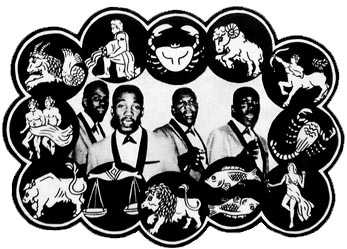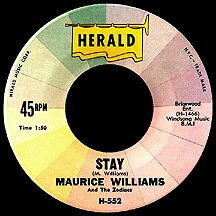MAURICE WILLIAMS
AND THE ZODIACS
Stay
It's the most fantabulous, fastest-flyin'-by chart-topper ever. "Stay" by Maurice Williams and the Zodiacs set a record for economy in music production by making good on a simple goal: jump right in, get to the point, thrill your listeners as you're rounding the one minute mark, and get out. Then they'll play it again and again (as you'll find I once did if you read on). "Stay" was the shortest-running number one hit in history at just over a minute and a half (though the label says 1:50, perhaps on purpose so that buyers of the 45 wouldn't feel cheated) and a high point, though not the only one, in Williams's career.
Maurice was first exposed to music in church while growing up in Lancaster, South Carolina. As a young child in the '40s, he began playing piano and by the time he was ten his fingers were quite fluent across the 88 keys. His vocal cords got a workout as well when he joined his mother and sister in the church choir. Then, he and best friend Earl Gainey put a gospel group together. The Junior Harmonizers were later seduced by the R&B songs they heard on the radio and during high school in the mid-'50s Maurice and Earl headed up a vocal quintet they called The Royal Charms. William Massey, Willie Jones and Norman Wade filled out the roster; they won a few talent contests in the Lancaster area, including one at their high school, and began getting weekend gigs.
A 500-mile excursion across the Great Smoky Mountains to Nashville in late 1956 had them knocking on the door of the Nashboro record company run by Ernie Young, who doubled as the owner of Ernie's Record Mart, the place to feed your hunger for records if you lived in Central Tennessee. Ernie liked them enough to take a chance, but insisted they dump the Royal Charms name (a logical suggestion considering The Charms, with lead singer Otis Williams, were already well established). Young liked flowers; The Marigolds had made records for his Excello label ("Rollin' Stone" their 1955 hit) and he christened Maurice's group The Gladiolas.
Maurice had written several songs, and of these Young saw potential in "Little Darlin'," a doo wop ditty the group had worked up; the recording, employing a calypso rhythm, established the Gladiolas with a sizeable hit that fell just short of both the R&B top ten and pop top 40 in the spring of 1957. Young was a fair-minded man, something unfortunately not very common among the owners of independent record labels. He gave full songwriting credit to Williams (where many bought the rights cheaply or in some cases just added their own names to that of the actual writer). This rare display of ethics brought Maurice a great deal of royalty money when Canadian quartet The Diamonds covered "Little Darlin'" and it became one of the hottest hits of the late '50s (their version on Mercury held the number two spot for two months, blocked from the top only because Elvis Presley had taken over the world and current hit "All Shook Up" was unshakable). The Diamonds version was not a particularly serious effort; the group's members admitted their slick production was done as a parody (they were as surprised as anyone when it went bigtime), complete with a hammed-up spoken passage by bass singer Bill Reed (trying not to laugh?), mimicking Maurice's sincere recital in the original.
Williams wasn't the least bit offended by any of this...how could he be with large amounts of moolah stuffed in his pockets? This wouldn't be the last time his knack for a catchy melody and clever lyric would reap substantial dividends. The immediate future, though, was less eventful...three more Excello singles fell flat and the group ventured out in search of new opportunities. Young had retained the rights to the Gladiolas name, so they were back to square one on that count. Throwing ideas around, they came up with Zodiacs. You'd think giving the band an astrological name would be a good idea as it hadn't been used by any known acts, but that's not how it came to be. The Zodiac was an automobile made by Ford in the U.K. during the '50s, a fully-loaded version of the Ford Zephyr. They liked the car and so the name stuck.
Some lineup changes occurred about this time; Gainey left and a new six-man outfit featured Williams, Henry Gaston, Wiley Bennett, Charles Thomas, Albert Hill and Little Willie Morrow. In addition, sax men Calvin McKinnie and Harold Alexander and drummer Mac Badskins (what else would he play with a name like that?) joined in on session dates and live appearances, making Maurice Williams and the Zodiacs a formidable nine-man band. Three singles were released in 1959 on smaller labels (two on Cole, one on Selwyn).

In 1960, they wound up over at Herald Records in New York City. Under Al Silver, the label had been a solid player in the R&B field since 1953; Silver set them up with producers Phil Gernhardt and Al McCullough. Maurice's latest creation, "Stay," was recorded soon afterwards. One adjustment to the lyrics seemed necessary: Maurice's line '...if we have another smoke, yeah' (had he conceived it as a Lucky Strike commercial?) was changed to '...if we have another dance, yeah' (to avoid corrupting the minds and lungs of teenagers). Williams sang the lead vocal and the falsetto hook 'Oh won't you stay...just a little bit longer?' was handled by Gaston, who could reach that really high range. The single, released on Herald's trademark yellow label, also came out on a snappy new multi-color label (which appears to have been used on only a handful of other Herald 45s). The song caught on quickly, debuting on the charts at the beginning of October '60 and going all the way to number one the third week in November.
There were five follow-up singles on the Herald label in '61 and '62. The first two, "I Remember" and "Come Along," made minor chart appearances, but the group never gained enough traction with airplay or sales to return anywhere near the level of "Stay," or even the Gladiolas' mid-chart "Little Darlin'" ("Stay" has had staying power, though; in 1963, The Hollies started their run of 18 U.K. top ten hits with a faster-tempo, but longer-running, version and remakes by The 4 Seasons in 1964, and Jackson Browne in 1978, reached the American top 20). One single as The Zodiacs came out on Atlantic in 1963, then they bounced around like they had in '59 with one-shot efforts for Sea-Horn, Sphere Sound and Scepter between '63 and '65. Another 1965 release, "May I" on Vee Jay, passed unnoticed but was reissued in 1967 on New Orleans label Dee Su, where they had several releases through 1968. The song received airplay in parts of the south and made an impact on the Carolina "beach" music scene...bringing Williams right back to the home front. Virginia Beach band Bill Deal and the Rhondels remade the song in 1968, taking it to the top 40 in early 1969, ultimately adding additional zeroes to the royalty checks Maurice was still receiving on a steady basis. He and a varying lineup of Zodiacs have continued to tour and record throughout the past four decades.
During my late-night oldies show days of the '80s, I invited a disc jockey friend to guest-host a show with me. At the time, we proudly considered ourselves radio "outsiders" (this was before I went corporate, a decision I still have mixed feelings about) and decided to do something unconventional as a protest of the "hit" stations that were rotating the tightest music playlists imaginable (we weren't able to foresee the hour-and-20-minute turnovers of today or we might have realized things probably weren't all that bad). Taking the shortest hit song we could think of, we slapped two copies on the turntables and played them back-to-back for a solid half hour, tightly fading one into the other. You guessed it: we played "Stay" 20 times in a row! We explained our reason at the end, but suffice it to say I didn't have many happy listeners that night...and probably lost a few for good. To tell the truth, part of the reason we did it was simply because we could. It's not that we were trying to pick on Maurice Williams and the Zodiacs; in a way it was a tribute to a great song that holds up under repeated spins better than most. Anyway, love ya Maurice, and I hope you got a little extra bonus on your royalty check as a result of our mad plan!


